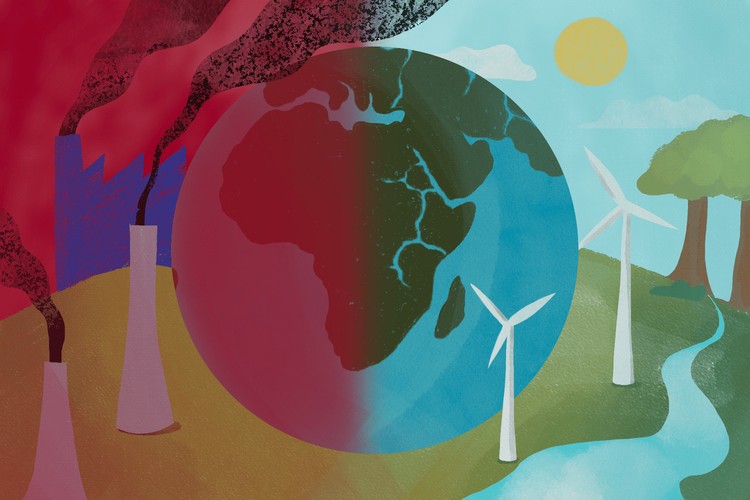Sasol makes the world CO2 emissions blacklist
The company is among 57 companies in the world responsible for 80% of carbon dioxide emissions
The Carbon Majors list of the companies responsible for four fifths of the world’s CO2 emissions includes Sasol. Graphic: Lisa Nelson
- Sasol is on the list of 57 companies in the world which are responsible for 80% of the world’s carbon dioxide emissions, according to a recent report.
- The “Carbon Majors” report is a database of historic production data from more than 100 of the biggest oil, gas, coal, and cement producers in the world.
- Sasol has said that it is committed to achieving a 30% reduction in emissions by 2030 and net zero by 2050.
- But shareholder activist group JustShare has warned that the company will not be able to reach net zero without “real, urgent accountability”.
Sasol is on the list of 57 big companies that produced 80% of the world’s CO2 emissions from 2016 to 2022, according to a new report from the Carbon Majors database earlier this month.
Sasol is ranked at 56. Carbon Majors is a database of historic production data from 122 of the world’s largest oil, gas, coal, and cement producers. The top emitters from 2016 to 2022 are Chinese state-owned coal companies (grouped as one in the report), Saudi Aramco, Gazprom, Coal India, and National Iranian Oil Company.
Despite the Paris Agreement on climate change signed in 2015, carbon emissions by many of the fossil fuel companies on the Carbon Majors list have increased in the past seven years compared to the seven years before.
In 2023 world CO2 emissions increased to a record-high, according to the International Energy Agency.
Sasol was ranked at number 47 for historical emissions during the years 1854 to 2022 in the Carbon Majors report. Two other South African companies, Seriti Resources and Exxaro Resources, were also listed as carbon majors, both from 2016-2022 and from 1854 to 2022.
Sasol’s total emissions increased slightly in 2023 from 2022 to over 64,000 kilotons of CO2, according to its 2023 Climate Change report. Sasol said in the report that the increase in total emissions was due to “higher production rates, as well as process inefficiencies, external power interruptions and shortage of natural gas”. The company said that in 2024, production levels are expected to increase, resulting in further increased emissions at its Secunda operations.
Referring to this report, spokesperson Matebello Motloung told GroundUp that the company has achieved an approximate 5% reduction from its 2017 baseline “through ongoing mitigation interventions”. However, this figure does not include its Natref refinery emissions nor its Mozambique operations.
Sasol has committed to reduce greenhouse gases by 30% by 2030 and reach Net Zero emissions by 2050, in line with the Paris Agreement. In terms of the Paris Agreement, which was signed by South Africa, emissions must be reduced to zero by 2050 in order to keep global temperature limited to a 1.5°C increase.
Asked to comment on the Carbon Majors report, Motloung said that the company “was not afforded an opportunity to consult on the report or its contents and as such we have not yet considered its contents in detail”.
But, he said, Sasol is “committed to decarbonising our operations and to 2050 Net Zero ambition”.
However, shareholder activist organisation JustShare has raised concerns that Sasol will not be able to meet its commitments.
The company is “facing a diminishing window to achieve its promised targets” Emma Schuster, senior climate risk analyst at JustShare, told GroundUp. She said Sasol had made no “discernible progress” on its targets.
Schuster said Sasol “has a 20 year record of failing to meet emissions targets” and had not put in place any mechanisms for holding those responsible accountable. “Its emissions – and those of most other carbon majors – continue to go up,” she said.
For years JustShare and the Centre for Environmental Rights have expressed concern that Sasol has not shown any real signs of decreasing its emissions.
As “by far the biggest sources of climate-changing greenhouse gases”, the companies in the Carbon Major list “have an outsized responsibility to reduce their emissions”, Schuster said. She said that the fossil fuel industry continued to generate substantial profits through the expansion of operations, despite record-high emissions in the past few years.
Sasol has said it is shifting its operation to produce green hydrogen from renewable energy and has recently signed a contract for the supply of 69 megawatts of renewable energy to its Sasolburg site. This is one of the “first of several agreements Sasol intends to finalise in the coming months as it secures the renewable energy supply required to produce green hydrogen”, the company said in a statement.
Support independent journalism
Donate using Payfast

Don't miss out on the latest news
We respect your privacy, and promise we won't spam you.
Next: Elections 2024: What the major political parties say about hunger
Previous: 450 families, one water tap in Cape Town informal settlement
© 2024 GroundUp. This article is licensed under a Creative Commons Attribution-NoDerivatives 4.0 International License.
You may republish this article, so long as you credit the authors and GroundUp, and do not change the text. Please include a link back to the original article.
We put an invisible pixel in the article so that we can count traffic to republishers. All analytics tools are solely on our servers. We do not give our logs to any third party. Logs are deleted after two weeks. We do not use any IP address identifying information except to count regional traffic. We are solely interested in counting hits, not tracking users. If you republish, please do not delete the invisible pixel.

